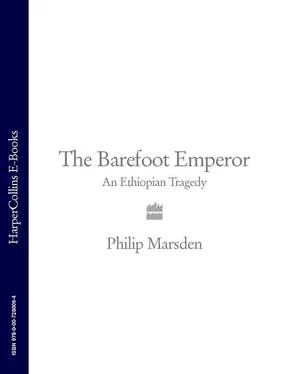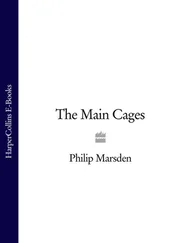At Bet Hor, on the edge of the Jidda gorge, British forces reached Tewodros’s road shortly after he had passed. They were amazed. Travelling with them was the geographer Clements Markham, and he stood at the cliff-edge and conceded the determination of the enemy: ‘A most remarkable work –a monument of dogged and unconquerable resolution. Rocks were blasted, trees sawn down, revetment walls of loose stone mixed with earth and branches built up, and everywhere a strengthening hedge of branches at the outer sides, to prevent the earthwork from slipping.’
Later Markham gathered more information about how Tewodros had transported Sevastopol from Debre Tabor, and became convinced that the story ‘entitles his march to rank as one of the most remarkable in history’. Dr Blanc, at the time a prisoner on Meqdela, and no friend of Tewodros, echoed Markham’s words. It was, he wrote in his own account, ‘a march unequalled in the annals of history’.
From Bet Hor, the route to Meqdela drops several thousand feet to the Jidda gorge, up onto the Delanta plateau and down again to the Beshilo river. Tewodros’s road is still visible in places, chiselled into the side of cliffs, scored around the bulge of steep-sided bluffs, zigzagging up dusty slopes. It took him and his followers months to build this section. I walked it in a few days. At eleven o’clock one morning, five o’clock Ethiopian time, *I reached the Fala saddle and saw the peak of Meqdela ahead, half-hidden by scarves of cloud. As I crossed Selamge, the cloud blew away to reveal a shadowy row of cliffs. It was a grim sight. The mountain’s flat peak was edged on all sides by a sheer drop of black basalt.
At the northern end of the massif, below the peak of Selassie, the entire scene was spread out below. I looked back at the way I had come. In the haze was the far-off horizon of Delanta, the descent to the Beshilo, the snaking valley of Wurq-Waha – ‘golden water’– and the final ascent. When Tewodros began to haul Sevastopol across this section, the advance guard of the British were just twenty or thirty miles behind him.
A short way along the clifftop was a small settlement. Thatched huts stood beneath the silvery-leaved eucalyptus; stockades were ringed by pickets of giant euphorbia. A young boy was following a slow herd of cattle back towards the huts. To one side stood a crude canopy of corrugated iron. Lying beneath it, looking somewhat like a fallen bell, still lay the bronze mass of Sevastopol.
I first heard about Ethiopia and Tewodros at the same time. My grandmother had a companion known simply as ‘Pillio’, who had tutored my uncle and father as boys and, so the story went, was the daughter of an Ethiopian princess from the days of ‘mad King Theodore’. From that time on, her high-necked beauty, her mysterious silence and this mad King Theodore took up lodgings together in some quiet suburb of my mind.
Much later, in the early 1980s, I went to Ethiopia for the first time. One evening, after curfew, I read Alan Moorehead’s sketch of Tewodros and the Meqdela campaign in The Blue Nile : ‘It has always been accepted that the Emperor Theodore was a mad dog let loose, a sort of black reincarnation of Ivan the Terrible.’ Clements Markham likened him to Peter the Great. During the bloody days of the Derg regime, with its random killings and its merciless war in Tigray and Eritrea, I saw parallels much closer to hand – with Colonel Mengistu and his ‘Red Terror’.
When I next visited Ethiopia some fifteen years later, Mengistu had gone. The paralysing fear had disappeared, replaced by a lurching and chaotic openness. Self-expression was no longer a subversive act. The iconography of globalised culture had shunted aside Soviet agitprop. On T-shirts and posters were stencilled the images of Leonardo DiCaprio, Tupac Shakur, Madonna and David Beckham. Emperor Haile Selassie’s regal figure had reappeared both in its local form and in the much-travelled Rastafarian version. In internet cafés, the most commonly consulted website was for US immigration and the Green Card Lottery.
I was surprised to find Tewodros among all this. But he was everywhere – on the walls of bars and on locally-printed T-shirts. I watched a teenager idly chalk his image on a rock. Market stalls sold Tewodros badges and Tewodros cotton tunics. In a government office, I spotted his fierce glare above an anti-corruption slogan: ‘Governing Self Behaviour is Best Skill of All’. At political rallies, I was told, a mention of his name was guaranteed to win the crowd. Everyone had an opinion of him, from taxi-drivers to suited businessmen, and it was universally positive. ‘Tewodros was our greatest patriot, a hero.’
‘But he was a monster!’ I spluttered.
‘So much Tewodros loved his country – I’m sorry, only to think of him makes me cry.’
I went to see an old friend. Teshome and I had travelled together years earlier, in the dark days of Colonel Mengistu. Teshome had always been a convincing and witty sceptic – sceptical about Mengistu and his Soviet backers, sceptical about Emperor Haile Selassie before them. Several years at an American law school had only made his suspicion of all power more articulate. The current regime was just as bad. But when it came to Tewodros, the scepticism vanished. ‘Tewodros?’ He paused, steepling his fingers in a courtroom gesture of reasoned thought. ‘What you have to understand, Philip, is that without him there would be no modern Ethiopia. Period.’
At the Institute of Ethiopian Studies, I thumbed through the library’s card index. It was all there – the Tewodros dramas, the Tewodros novels, the poems and the doctoral theses. One or two voices spoke out against him, but the predominant tone was hagiographic. Tsegaye Gabre-Medhin, who wrote a play called Tewodros in 1962, said that the ‘heroification’ of the emperor was necessary in part because foreign authors had so tarnished his image. He in turn accused the critical Ethiopian scholars of ‘ meqegna ’, jealousy, or needless iconoclasm.
Somewhere between the cult of Tewodros and its bloodless deconstruction lay the story itself. Only by reading the accounts of contemporary witnesses do the raw impressions of the time emerge. The European hostages left between them a mass of memoirs and letters. The Ethiopian side is less well represented, but there are a good number of contemporary Amharic letters, including those from Tewodros himself. Several Amharic chronicles too survive. Scholars have dismissed these for their eccentric chronology and distortions, but like the letters their viewpoint and language (even in translation) are wonderfully evocative. With the European accounts they conjure up a remarkable moment in history.
Until the middle of the nineteenth century, the world was an archipelago of loosely connected peoples. All over Africa and Asia, a pushy Europe was coming face to face with long-isolated nations. It is a process that has, in little more than a century, accelerated into a global frenzy of connectivity – skies criss-crossed by vapour trails, overhead cables pulsing with hypertext. In few instances were the initial meetings so bright and hopeful, or so swiftly shadowed, as they were in the 1850s and 1860s in Ethiopia.
For the ancient empire, tracing its roots to the reign of King Solomon nearly 3,000 years earlier, the episode was a bracing and too-sudden encounter with the modern age. For the British, reaching the height of imperial power, what began as an irksome diversion required in the end one of the most bizarre and elaborate military campaigns ever undertaken.
Yet for all its historical interest, the story belongs to the individuals – the European envoys, the adventurers and missionaries drawn into Tewodros’s thrilling and perilous world; the Ethiopians who followed him with such passion; and the emperor himself with his messianic appeal, his capricious brutality.
Читать дальше












